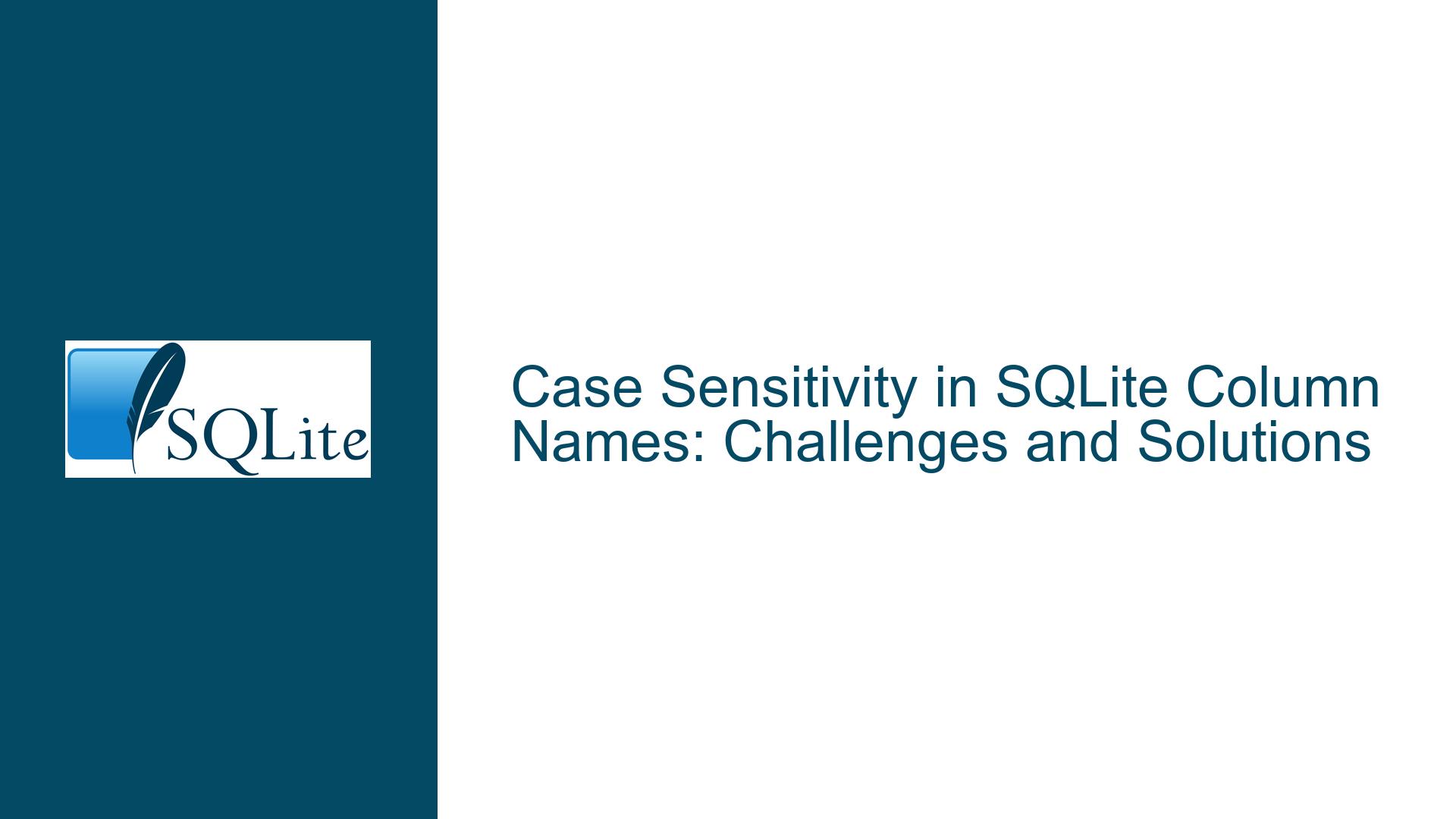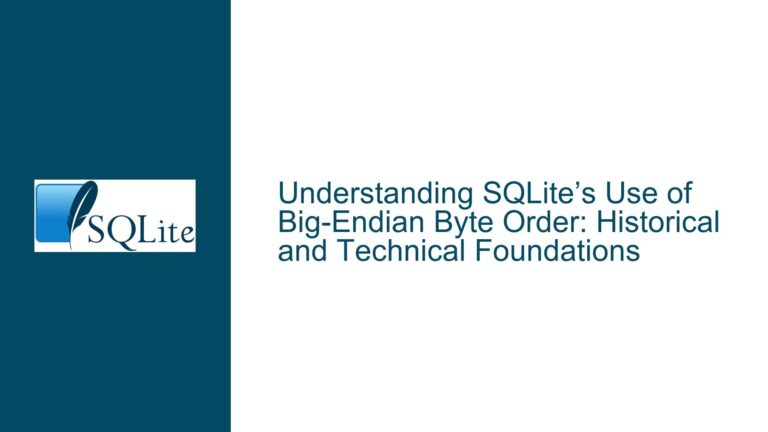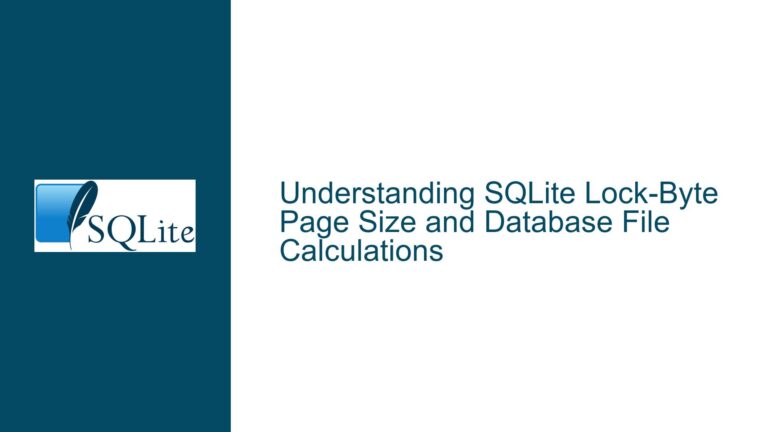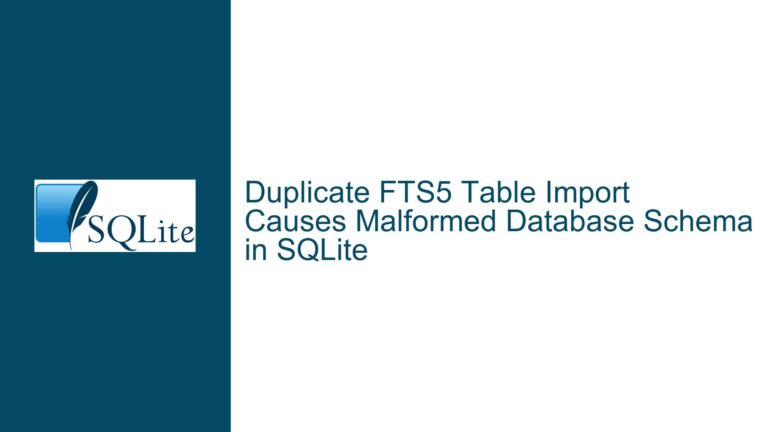Case Sensitivity in SQLite Column Names: Challenges and Solutions
Understanding Case Sensitivity in SQLite Column Names
SQLite, by design, treats column names as case-insensitive identifiers. This means that columnName, COLUMNNAME, and columnname are considered the same by SQLite. While this design choice simplifies many use cases, it introduces challenges when interoperability with other database systems is required. Databases like PostgreSQL, MySQL (on Linux), and OpenStreetMap (OSM) enforce case sensitivity in column names, especially when identifiers are quoted. This discrepancy can create significant hurdles when migrating data between SQLite and these systems, particularly in specialized domains like geospatial data management (e.g., GeoPackage).
The core issue lies in SQLite’s handling of identifiers. Unlike PostgreSQL, where quoted identifiers preserve case sensitivity, SQLite folds all unquoted identifiers to lowercase internally. Even when identifiers are quoted, SQLite does not enforce case sensitivity, which deviates from the SQL standard. This behavior can lead to data migration failures, loss of traceability, and compatibility issues when working with systems that rely on case-sensitive column names.
Why Case Sensitivity Matters in Database Interoperability
Case sensitivity in column names becomes critical when dealing with data migration and interoperability between database systems. For instance, geospatial databases like PostgreSQL (with PostGIS) often use case-sensitive column names to maintain consistency with external standards or legacy systems. When exporting data from such systems to SQLite, the lack of case sensitivity can result in column name conflicts or data loss. For example, a table with columns Latitude and latitude would be treated as the same in SQLite, whereas PostgreSQL would treat them as distinct.
Moreover, the SQL standard mandates that quoted identifiers should preserve case sensitivity. SQLite’s deviation from this standard creates friction when integrating with other databases that adhere strictly to the standard. This is particularly problematic in environments where data must be portable across multiple systems, such as in geospatial applications using the GeoPackage format. The inability to preserve case-sensitive column names during migration can break workflows and require manual intervention to resolve conflicts.
Implementing Case Sensitivity in SQLite: Troubleshooting and Solutions
While SQLite does not natively support case-sensitive column names, there are workarounds and strategies to mitigate the issue. Below, we explore practical steps to address the challenges posed by case insensitivity in SQLite.
1. Use Quoted Identifiers Consistently
Although SQLite does not enforce case sensitivity, it does allow quoted identifiers to include mixed-case characters. By consistently using double quotes around column names, you can preserve the original casing during schema creation and queries. For example:
CREATE TABLE "GeoData" (
"ID" INTEGER PRIMARY KEY,
"Latitude" REAL,
"Longitude" REAL
);
When querying this table, you must use the quoted identifiers to avoid ambiguity:
SELECT "Latitude", "Longitude" FROM "GeoData";
While this approach does not enforce case sensitivity, it ensures that the original casing is preserved, which can be useful for compatibility with other systems.
2. Leverage Application-Level Enforcement
Since SQLite does not enforce case sensitivity at the database level, you can implement enforcement logic in your application code. For example, before migrating data from a case-sensitive database to SQLite, you can validate column names to ensure there are no conflicts. This can be done by maintaining a mapping of original column names to their SQLite-compatible counterparts.
Here’s an example in Python:
import sqlite3
def migrate_data(source_cursor, target_connection):
source_cursor.execute("SELECT column_name FROM information_schema.columns WHERE table_name = 'GeoData';")
columns = [row[0] for row in source_cursor.fetchall()]
# Check for case-insensitive conflicts
lowercase_columns = [col.lower() for col in columns]
if len(lowercase_columns) != len(set(lowercase_columns)):
raise ValueError("Case-insensitive column name conflict detected.")
# Create table in SQLite
target_cursor = target_connection.cursor()
target_cursor.execute(f"""
CREATE TABLE "GeoData" (
{', '.join(f'"{col}" REAL' for col in columns)}
);
""")
# Migrate data
source_cursor.execute("SELECT * FROM GeoData;")
for row in source_cursor.fetchall():
target_cursor.execute(f"""
INSERT INTO "GeoData" ({', '.join(f'"{col}"' for col in columns)})
VALUES ({', '.join(['?'] * len(columns))});
""", row)
target_connection.commit()
This approach ensures that column name conflicts are detected and resolved before data migration.
3. Use a Custom Naming Convention
To avoid conflicts altogether, you can adopt a naming convention that eliminates the possibility of case-insensitive collisions. For example, you could prefix column names with a unique identifier or use underscores to separate words:
CREATE TABLE GeoData (
geo_id INTEGER PRIMARY KEY,
geo_latitude REAL,
geo_longitude REAL
);
This convention ensures that column names are unique even when case is ignored.
4. Extend SQLite with Custom Functions
For advanced use cases, you can extend SQLite’s functionality by writing custom C functions or using extensions to enforce case sensitivity. While this requires significant effort, it provides a robust solution for environments where case sensitivity is non-negotiable.
Here’s a high-level overview of the steps involved:
- Define a Custom Collation Sequence: Create a collation sequence that treats column names as case-sensitive.
- Modify the Schema Parsing Logic: Override SQLite’s default behavior to use the custom collation sequence for column name comparisons.
- Integrate the Extension: Compile the extension and load it into your SQLite environment.
This approach is complex and should only be considered when other solutions are insufficient.
5. Advocate for Native Support
Finally, you can contribute to the SQLite community by advocating for native support for case-sensitive column names. This could involve submitting feature requests, participating in discussions, or even contributing code to the SQLite project. While this is a long-term solution, it has the potential to benefit the entire SQLite user base.
Conclusion
Case sensitivity in column names is a nuanced issue that can significantly impact database interoperability, particularly in specialized domains like geospatial data management. While SQLite’s case-insensitive handling of column names simplifies many use cases, it creates challenges when working with systems that enforce case sensitivity. By using quoted identifiers, implementing application-level enforcement, adopting custom naming conventions, or extending SQLite’s functionality, you can mitigate these challenges and ensure seamless data migration and compatibility. For long-term solutions, advocating for native support within the SQLite community can help address this issue at its root.






